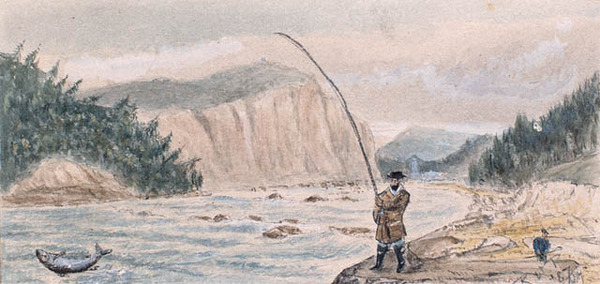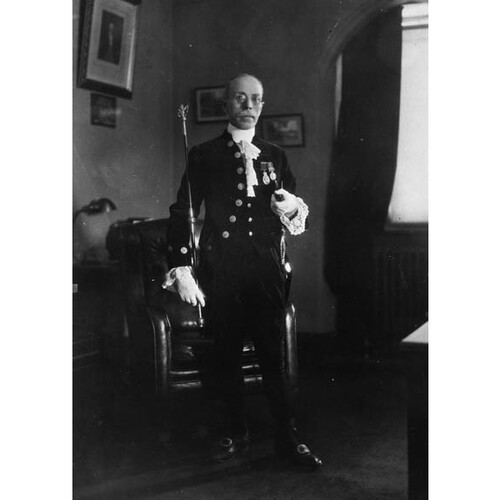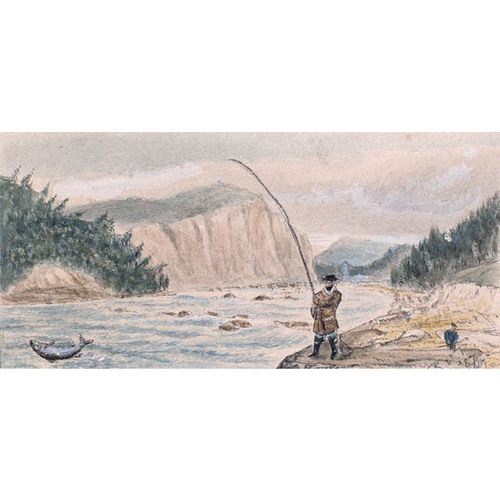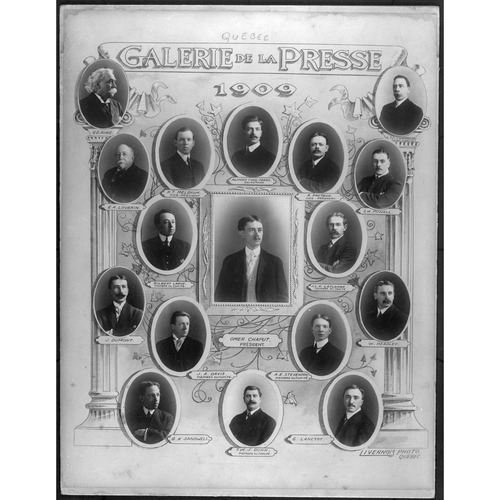Chambers, Edward Thomas Davies, school principal, journalist, author, and civil servant; b. 26 June 1852 in Saffron Walden, England, eldest son of Edward Thomas Chambers and Louisa Percy Davies; m. 3 Jan. 1872 Margaret Jamieson in Valcartier, Que., and they had four sons and a daughter; d. 5 Oct. 1931 in Quebec City.
Popularly known as E. T. D., Edward Thomas Davies Chambers trained as a teacher in England and immigrated to Canada in 1870 with his parents and siblings, including his younger brother Ernest John*. His father would become headmaster of a school in Montreal. E. T. D. took up a position in St Andrews (Saint-André-d’Argenteuil) as principal of the model school there; later, he held a similar post at an academy in Granby.
Chambers soon abandoned education for journalism. Attempting to foster progressive ideas in the county of Argenteuil, he helped establish a weekly, the Progress (St Andrews), which provided information on railway construction and immigration, and promoted local industries. Published from August 1874 until January 1875, the small paper made an impression on Quebec City journalists, and around 1876 Chambers departed to join the editorial staff of the Quebec Saturday Budget, a weekly commercial publication of the Daily Telegraph. The following year he became editor of the Telegraph. About 1878 he obtained a position as assistant editor with the paper’s competitor, the Morning Chronicle, an organ that had strong Conservative leanings.
The highlight of Chambers’s career as a journalist may have been his experience as a correspondent covering the North-West rebellion of 1885 [see Louis Riel*], when he was accompanied by his brother Ernest. For the most part, he wrote on subjects of local interest, especially municipal and provincial politics. In May 1897 he succeeded George Stewart* as editor of the Chronicle. Shortly after the paper changed hands in late 1898, he began to work as an independent journalist. Except for brief periods spent editing the monthly North American Notes and Queries (June 1900 to March 1901) and the Quebec Daily Mercury (1902–3), he would continue as a parliamentary correspondent for a variety of newspapers until 1911. He served as president of the press gallery at the Legislative Assembly in 1906–8. During his nearly 40 years as a journalist and editor he gained the respect of readers and colleagues alike.
Chambers was involved in various aspects of community life. He sat as a city councillor for Saint-Louis ward from 1884 to 1894 and was acting mayor for part of this decade. He participated in the Literary and Historical Society of Quebec, and held its presidency in 1919–20. A prominent freemason and member of several masonic bodies, he would become a grand master of the Grand Lodge of Quebec, a grand master in the Ancient and Accepted Scottish Rite, and a member of the Royal Order of Scotland.
These activities and his journalistic experience provided Chambers with a unique understanding of the city’s heritage and its social, political, and economic culture. His publications, notably The port of Quebec: its facilities and prospects: the past, present and future of Quebec’s shipping trade (Quebec City, 1890) and Quebec, ancient and modern … (Montreal, [1891]), reveal his enthusiastic promotion of Quebec City as a major economic hub of North America. As part of the committee organizing the celebration of its tercentenary in 1908 [see Albert Henry George Grey*], he contributed to building the image of the city as a historical and cultural landmark.
Nowhere was Chambers’s talent as a promoter more evident than in his popular tourist guidebooks. Written in a manner that evoked the conventions of earlier travel literature, yet updated for modern sensibilities, The St. Louis Hotel guide to Quebec (New York and Montreal, 1892) and The guide to Quebec (Quebec City, 1895) celebrated the traditions of the city and province and set forth their ambitions for the 20th century. Another group of publications, aimed specifically at the sportsman, included Quebec, Lake St. John, and the new route to the far-famed Saguenay ([Quebec City?, 1893?]), The angler’s guide to eastern Canada … (Quebec City, 1898), and The … sportsman’s … companion … ([Quebec City], 1899), the last of which he co-authored with Louis-Zéphirin Joncas*. His guidebooks, like those of other writers, freely stereotyped Amerindian peoples and the French Canadian rural and working classes through the use of picturesque and romantic descriptions. In addition, Chambers’s appropriation and definition of French Canada’s cultural legacy provoked criticism from members of the intelligentsia, including Phillippe-Baby Casgrain and André-Napoléon Montpetit.
Unperturbed by disapproval, Chambers came to develop a synthesis of his two main passions – writing and the outdoors – that eventually earned him a measure of international acclaim. His articles on field sports, particularly angling, appeared in Fishing Gazette (London, Eng .), American Angler (New York), Harper’s Magazine (New York), Rod and Gun in Canada (Montreal), Field and Stream (New York), and many other publications. He was solicited to write essays on Canada and Quebec for foreign guidebooks, such as the Karl Baedeker firm’s handbook for European travellers, The Dominion of Canada … (Leipzig, Germany, 1894) and Sir Herbert Eustache Maxwell’s Fishing at home & abroad (London, Eng., 1913). His best-known work remains The ouananiche and its Canadian environment (New York, 1896), a blend of natural history and boosterism of Quebec’s emblematic game fish, the ouananiche, the freshwater form of the Atlantic salmon (Salmo salar). He shared his expertise on wildlife by serving as secretary-treasurer of the North American Fish and Game Protective Association, as a director of the Province of Quebec Association for the Protection of Fish and Game, and as a Canadian delegate to meetings of the American Ornithologists’ Union and the Audubon societies.
In 1911 the government of Quebec acknowledged his experience, naming him a special agent of the Department of Colonization, Mines, and Fisheries. In this capacity he toured the province to ensure compliance with fish and game regulations, sought ways to improve conditions for fishermen on the north shore of the St Lawrence, and promoted the development of fox farming as a rural enterprise. He contributed articles on the government of Quebec, its system of taxation and finance, and its forestry and fishery to the series Canada and its provinces … (Toronto, 1913–17), edited by Adam Shortt and Arthur George Doughty. When, in 1915, Ottawa decided to turn over most of its fish hatcheries to provincial control, Chambers became Quebec’s superintendent of hatcheries. He oversaw Quebec’s participation in a North American-wide exchange of fish that started in 1921; this program introduced many non-indigenous species such as the rainbow trout (Oncorhynchus mykiss) into the province’s freshwater ecosystems. Although he acted as superintendent until his death, by 1927 declining health forced him to remain at home.
The social and political network that Chambers developed as a journalist, combined with his intimate knowledge of tourist expectations and the inner workings of government bureaucracy, permitted him to play a significant role in shaping Quebec’s nascent recreational fishery and anticipated the province’s exploitation of the environment as a source of tourism revenue. His promotion of field sports for a wealthy elite and his enforcement of game laws altered the ordinary citizen’s traditional access to these natural resources, and his introduction of new species of fish left Quebec with an environmental legacy that is not yet fully understood.
The publications of Edward Thomas Davies Chambers mentioned in the text, as well as numerous others that he compiled for Quebec’s provincial government, are listed in the CIHM, Reg.
BANQ-Q, CE301-S84, 3 janv. 1872; E5, Arrêtés en conseil, 1911, no.237; TL31, S1, SS1, 1902–9. Chronicle-Telegraph (Quebec City), 5 Oct. 1931. Progress (St Andrews [Saint-André d’Argenteui], Que.), 1874–75. Le Soleil, 5 oct. 1931. Canadian men and women of the time (Morgan; 1898 and 1912). Directory, Quebec City, 1875–1931. J. Hamelin et al., La presse québécoise. A.‑N. Montpetit, Les poissons d’eau douce du Canada (Montréal, 1897). Que., Parl., Sessional papers, 1907–29 (general reports of the minister of colonization, mines, and fisheries of the prov. of Que., 1905–28). The Quebec tercentenary commemorative history, ed. and comp. Frank Carrel and Louis Feiczewicz, intro. A. G. Doughty (Quebec City, 1908).
Cite This Article
Darin Kinsey, “CHAMBERS, EDWARD THOMAS DAVIES,” in Dictionary of Canadian Biography, vol. 16, University of Toronto/Université Laval, 2003–, accessed February 19, 2026, https://www.biographi.ca/en/bio/chambers_edward_thomas_davies_16E.html.
The citation above shows the format for footnotes and endnotes according to the Chicago manual of style (16th edition). Information to be used in other citation formats:
| Permalink: | https://www.biographi.ca/en/bio/chambers_edward_thomas_davies_16E.html |
| Author of Article: | Darin Kinsey |
| Title of Article: | CHAMBERS, EDWARD THOMAS DAVIES |
| Publication Name: | Dictionary of Canadian Biography, vol. 16 |
| Publisher: | University of Toronto/Université Laval |
| Year of publication: | 2014 |
| Year of revision: | 2014 |
| Access Date: | February 19, 2026 |






